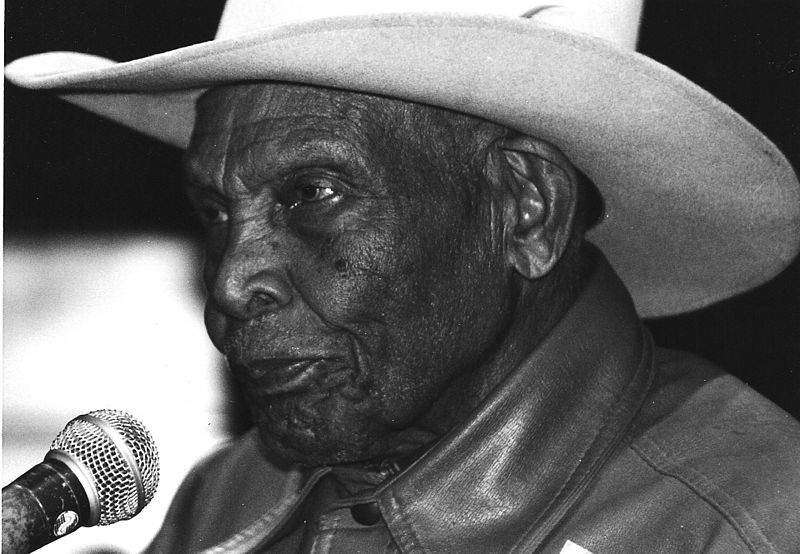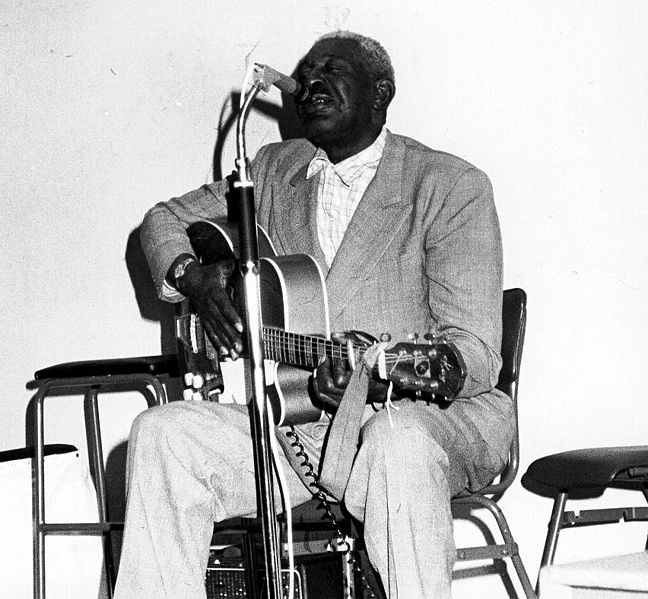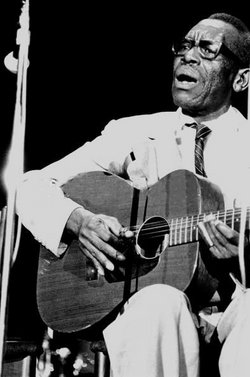<Back to Index>
- Bluesman Jack Owens, 1904
- Bluesman Arthur "Big Boy" Crudup, 1905
- Bluesman John Henry Barbee (William George Tucker), 1905
PAGE SPONSOR

Jack Owens (November 17, 1904 – February 9, 1997) was an American Delta blues singer and guitarist, from Bentonia, Mississippi, United States.
Born L.F. Nelson, Jack Owens' mother was Celia Owens, but his father, who bore the Owens surname, abandoned his family when Jack was 5–6 years old. After that time, he was raised by the Owens family, with his maternal grandfather the patriarch of 8 children according to the 1910 Census, and of them, two other children officially shared the Nelson name. (This does not account for two more children born after the census.) While very young, Owens learned some chords on the guitar from his father, and an uncle, and learned to play the fife, the fiddle, and piano while still a child, but his chosen instrument remained the guitar.
As he matured, Owens did not seek to become a professional recording artist, but he farmed, bootlegged and ran a weekend juke joint in Bentonia for most of his life. His peer, Skip James, had left home and traveled until he found a talent agent and a record label to sign him, but Owens had preferred to remain at home, selling potliquor and performing only on his front porch. He was not recorded until the blues revival of the 1960s, being rediscovered by a musicologist, David Evans, in 1966, who had been taken to meet Owens by either Skip James or Cornelius Bright. Evans noted that while James and Owens had many elements in common, and a sound peculiar to that region, referred to as "Bentonia School", there were also strong differences in Owens' delivery. Both James, Owens, and others from the area, (including Bukka White), shared a particular guitar style and repertoire utilizing open D-minor tuning (DADFAD). Owens, though, had experimented with several other tunings which appear to be Owens' own. He played guitar and sang, utilizing the stomp of his boots for rhythm in the manner of some other players in the Mississippi delta, such as John Lee Hooker. James employed the use of falsetto, and, by this time, was accustomed to singing quietly for recording sessions, while Owens still sang roughly in his usual singing voice loudly enough for people at a party to hear while dancing. Evans, excited to find a piece of history in Jack Owens, made recordings of him singing, which eventually showed up on Owen's first record album Goin' Up the Country that same year and It Must Have Been the Devil (with Bud Spires) in 1970. He made other recordings (some by Alan Lomax) in the 1960s and 1970s.
Owens traveled the music festival circuit in the United States and Europe throughout the final decades of his life, often accompanied on harmonica by his friend Bud Spires, until his death in 1997. He was frequently billed in the company of other noteworthy blues musicians that maintained a higher profile than Owens, who nonetheless were longtime associates. One such performance was with Spires in an All-star Chess Records tribute in 1994 at the Long Beach Blues Festival, alongside acts that included Jeff Healey, Hubert Sumlin, Buddy Guy, the Staple Singers and Robert Cray's band, among many others, in Long Beach, California.
Jack Owens died, at the age of 92 in Yazoo City, Mississippi, in 1997.

Arthur "Big Boy" Crudup (August 24, 1905 – March 28, 1974) was an American Delta blues singer, songwriter and guitarist. He is best known outside blues circles for writing songs such as "That's All Right" (1946), "My Baby Left Me" and "So Glad You're Mine", later covered by Elvis Presley and dozens of other artists.
Arthur Crudup was born in Forest, Mississippi, United States. For a time he lived and worked throughout the South and Midwest as a migrant worker. He and his family returned to Mississippi in 1926. He sang gospel, then began his career as a blues singer around Clarksdale, Mississippi. As a member of the Harmonizing Four he visited Chicago in 1939. Crudup stayed in Chicago to work as a solo musician, but barely made a living as a street singer. Record producer Lester Melrose allegedly found him while he was living in a packing crate, introduced him to Tampa Red and signed him to a recording contract with RCA Victor's Bluebird label.
He recorded with RCA in the late 1940s and with Ace Records, Checker Records and Trumpet Records in the early 1950s and toured throughout the country, specifically black establishments in the South, with Sonny Boy Williamson II and Elmore James (around 1948). He also recorded under the names Elmer James and Percy Lee Crudup. He was popular in the South with records such as "Mean Old 'Frisco Blues", "Who's Been Foolin' You" and "That's All Right".
Crudup stopped recording in the 1950s, however, after further battles over royalties. His last Chicago session was in 1951. His 1952 - 54 recording sessions for Victor were held at radio station WGST in Atlanta, Georgia. He returned to recording with Fire Records and Delmark Records and touring in 1965. Sometimes labeled as "The Father of Rock and Roll", he accepted this title with some bemusement. Ungratified due to the loss of royalties, he would refer to his admirer Presley as 'Elvin Preston'. Throughout this time Crudup worked as a laborer to augment the non - existent royalties and the small wages he received as a singer. Crudup returned to Mississippi after a dispute with Melrose over royalties, then went into bootlegging, and later moved to Virginia where he had lived and worked as a musician and laborer. In the early 1970s, two local Virginia activists, Celia Santiago and Margaret Carter, assisted him in an attempt to gain royalties he felt he was due, with little success.
From the mid 1960s, Crudup returned to bootlegging and working as an agricultural laborer, chiefly in Virginia, where he lived with his family including three sons and several of his own siblings. On the Eastern Shore of Virginia, while he lived in relative poverty as a field laborer, he occasionally sang and supplied moonshine to a number of drinking establishments, including one called the Dew Drop Inn, in Northampton County for some time prior to his death from complications of heart disease and diabetes. On a 1970 trip to the UK he recorded Roebuck Man with local musicians. His last professional engagements were with Bonnie Raitt.
There was some confusion as to his actual date of death because of his use of several names, including those of his siblings. He died of a heart attack in the Nassawadox hospital in Northampton County, Virginia in March 1974.
Crudup was honored with a marker on the Mississippi Blues Trail placed at Forest.
"Do what you can do" Tampa Red told Crudup, "what you can't do, forget about it".

John Henry Barbee (November 14, 1905 – November 3, 1964) was an American blues singer and guitarist. He was born William George Tucker in Henning, Tennessee, United States, and changed his name with the commencement of his recording career to reflect his favorite folk song, "The Ballad of John Henry".
Barbee toured in the 1930s throughout the American South singing and playing slide guitar. He teamed up with Big Joe Williams, and later on, with Sunnyland Slim in Memphis, Tennessee. Traveling down to Mississippi he also came across Sonny Boy Williamson I, and played with him off and on for several years. He released two sides on the Vocalion label in 1939 ("Six Weeks Old Blues" / "God Knows I Can't Help It"). The record sold well enough to cause Vocalion to call on Barbee again, but by that time he had left his last known whereabouts in Arkansas. Barbee explained that this sudden move was due to his evading the law for shooting and killing his girlfriend's lover. He later found out that he had only injured the man, but by the time this was discovered, Barbee had moved on from making a career out of playing music.
Barbee did not show up again in the music industry until the early 1960s, whereby this time the blues revival was in full swing. Willie Dixon searched out for Barbee, and found him working as an ice cream server in Chicago, Illinois. In 1964 he joined the American Folk Blues Festival on a European tour with fellow blues players, including Lightnin' Hopkins and Howlin' Wolf.
In a case of tragic circumstances, Barbee returned to the United States and used the money from the tour to purchase his first automobile. Only ten days after purchasing the car, he accidentally ran over and killed a man. He was locked up in a Chicago jail, and died there of a heart attack a few days later, November 3, 1964, 11 days before his 59th birthday.
He is interred in the Restvale Cemetery in Alsip, Illinois.
On May 11, 2010 the third annual White Lake Blues Festival took place at the Howmet Playhouse Theater in Whitehall, Michigan. The concert was organized by executive producer, Steve Salter, of the nonprofit organization Killer Blues in order to raise monies to honor Barbee's unmarked grave with a headstone. The event was a success, and a stone was placed in June, 2010.